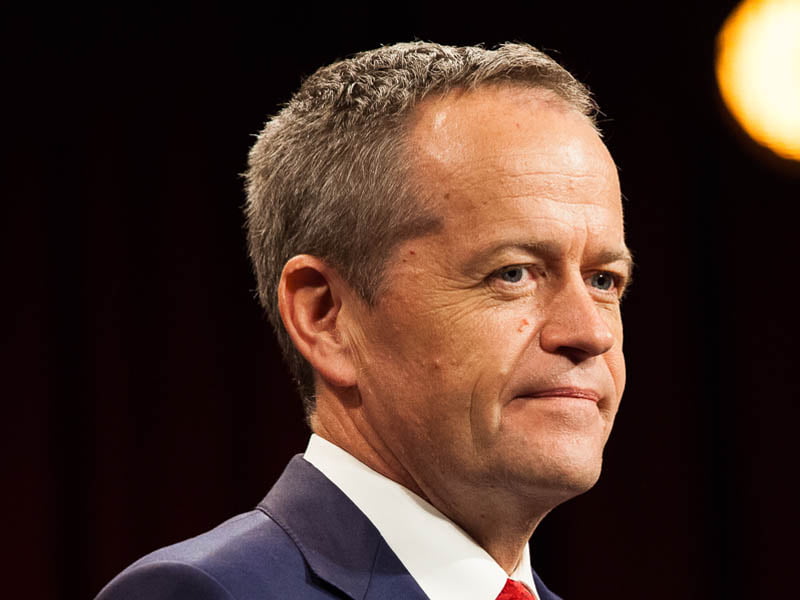Australia’s wages system needs to be “renovated” to help prepare for technology change, Opposition Leader Bill Shorten said, as he positioned the upcoming election as a “referendum on wages”.
Addressing the Australian Financial Review’s Business Summit on Wednesday morning, Mr Shorten laid out Labor’s economic focus for the upcoming May election, as campaigning from both parties ramps up before the election has even officially been called.
Improving wages and job conditions will help Australia adapt to the upcoming wave of technological change, he said.

“The next election will be a referendum on wages. It will be a contest about who the economy should work for, in whose interests the system should serve. I believe we need to renovate our system to revive negotiation and cooperation,” Mr Shorten said.
“Our wages system, our remuneration system, needs to be renovated to prepare our workforce for an economy that will change as much in the next 20 years as it did in the previous one hundred years. To prepare for an economy shaped by artificial intelligence and automation taking over repetitive function.”
This “renovation” will start with employers, and Mr Shorten pledged to work with businesses of all sizes if his party wins the election.
“I recognise the future of work and productivity begins with adaptive, innovative employers investing more capital, taking risks, being entrepreneurial, employing new skills and applying the highest level of community standards,” he said.
“[We will] work with businesses big and small. We’ll work with farmers and startups and entrepreneurs. We will encourage businesses to grow and invest and employ and export. We will represent Australians looking for work, training for work, Australians in work and Australians retired from work.”
But Mr Shorten did signal a tightening of the rules surrounding skilled visas, something which may concern a tech sector which has regularly raised the issue of a talent gap and difficulty in bringing in workers from overseas to fill specialist roles.
“We will crack-down on sham contracting and the rorting of skills visas. We’re going to stop the use of labour hire being used as a tool to drive down wages and job security of permanent labour in a business,” Mr Shorten said.
Getting wages moving is the “number one social and economic issue in the nation”, the Opposition Leader said.
“It is a fundamental economic imperative to get wages moving. Our opponents, they like to say the word ‘jobs’. But they never actually talk about the quality of the jobs, the conditions, the job security – and the pay,” Mr Shorten said.
“And when jobs growth is absorbed by casual work, by part-time work, by contract and labour hire, by insecure work, when the new jobs that are created are ones where you find out your shifts the night before by text, if you’re working, this means that more people are in roles where they don’t have the power or the certainty or the position or the luxury to bargain for better pay and better conditions.”
This change is equal to disruptions brought on by technology he said.
“We need to breathe new life into the Australian way. We need a renewed sense of cooperation, a renewed willingness on all sides to sit down and negotiate. But to achieve these things, we need a system that makes negotiation worthwhile, for both employers and employees,” Mr Shorten said.
“Our system is failing Australians in labour hire, people who are as trapped as those mythical unicorns of the employment market ‘permanent casuals’. And it’s failing good employers too.”
In his own address to the AFR Business Summit on Tuesday morning, Prime Minister Scott Morrison agreed that the election will have a “profound impact on the economy”.
“We believe a stronger economy can raise everybody up and I think that’s one of the key differences between our government and the Labor Party and what they’re offering for the next election. We will stay the course with policies that achieve this and we will ensure that those policies, our plan for a stronger economy, is in place,” Mr Morrison said.
“Strong budgets so governments live within their means. Lower taxes, open trade, backing small businesses, promoting cooperative workplaces based on the rule of law, sensible climate policy alongside reliable, affordable energy supply.”
Mr Morrison also somewhat surprisingly announced his support for emerging technologies like blockchain.
“Backing all of our industries to be world-class – not just the shiny, bright new ones – they’re fantastic, love them, they’re great, love them, fantastic, blockchain, high tech, all of them are doing so well – but so is resources, so is agriculture, so is forestry,” he said.
Do you know more? Contact James Riley via Email.

